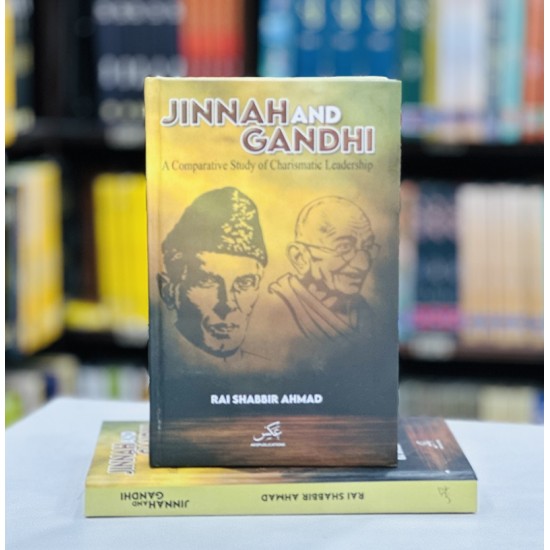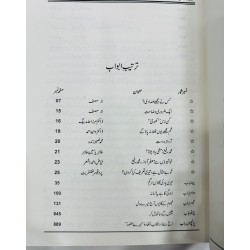
Jinnah And Gandhi : A Comparative Study of Charismatic Leadership
- Writer: Rai Shabbir Ahmad
- Category: Politics Books
- Pages: 304
- Stock: In Stock
- Model: STP-12974
Rs.2,000
In "Jinnah and Gandhi: A Comparative Study of Charismatic
Leadership," the author delves into the contrasting yet captivating
personas of two iconic leaders who played instrumental roles in shaping
the Indian subcontinent during a crucial period of its history. This
insightful and meticulously researched book offers a compelling
exploration of the charismatic leadership styles of Muhammad Ali Jinnah
and Mahatma Gandhi, shedding light on their distinct approaches to
politics, nation-building, and the quest for independence.
The narrative begins by providing a comprehensive background on the socio-political landscape of British India, setting the stage for the emergence of Jinnah and Gandhi as influential figures in the early to mid-20th century. The author skillfully navigates through the lives of these two leaders, analyzing their speeches, writings, and actions to unravel the unique qualities that defined their charismatic appeal.
The reader is taken on a captivating journey through the ideological differences and strategic decisions that marked the leadership of Jinnah, the eloquent and determined advocate for a separate Muslim state, and Gandhi, the symbol of nonviolent resistance and Hindu-Muslim unity. The book carefully dissects the personal convictions, communication styles, and methods of mobilization employed by each leader, providing valuable insights into their impact on the masses and the political landscape.
Through meticulous comparative analysis, the author explores how Jinnah and Gandhi navigated the complex challenges of their time, addressing issues of identity, religious coexistence, and the struggle for self-determination. The book highlights key moments of convergence and divergence in their leadership trajectories, ultimately offering a nuanced understanding of the complex dynamics that shaped the course of Indian history.
"Jinnah and Gandhi" is not merely a historical account but a thought-provoking study that prompts readers to reflect on the enduring legacy of charismatic leadership and its implications for contemporary leadership challenges. This book is a must-read for anyone interested in the intricate tapestry of South Asian history, the dynamics of charismatic leadership, and the profound impact of these two remarkable figures on the destiny of a subcontinent in transition.
The narrative begins by providing a comprehensive background on the socio-political landscape of British India, setting the stage for the emergence of Jinnah and Gandhi as influential figures in the early to mid-20th century. The author skillfully navigates through the lives of these two leaders, analyzing their speeches, writings, and actions to unravel the unique qualities that defined their charismatic appeal.
The reader is taken on a captivating journey through the ideological differences and strategic decisions that marked the leadership of Jinnah, the eloquent and determined advocate for a separate Muslim state, and Gandhi, the symbol of nonviolent resistance and Hindu-Muslim unity. The book carefully dissects the personal convictions, communication styles, and methods of mobilization employed by each leader, providing valuable insights into their impact on the masses and the political landscape.
Through meticulous comparative analysis, the author explores how Jinnah and Gandhi navigated the complex challenges of their time, addressing issues of identity, religious coexistence, and the struggle for self-determination. The book highlights key moments of convergence and divergence in their leadership trajectories, ultimately offering a nuanced understanding of the complex dynamics that shaped the course of Indian history.
"Jinnah and Gandhi" is not merely a historical account but a thought-provoking study that prompts readers to reflect on the enduring legacy of charismatic leadership and its implications for contemporary leadership challenges. This book is a must-read for anyone interested in the intricate tapestry of South Asian history, the dynamics of charismatic leadership, and the profound impact of these two remarkable figures on the destiny of a subcontinent in transition.
| Book Attributes | |
| Pages | 304 |






